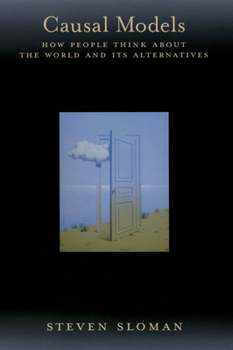Causal Models: How People Think about the World and Its Alternatives
Select Format
Select Condition 
Book Overview
Human beings are active agents who can think. To understand how thought serves action requires understanding how people conceive of the relation between cause and effect, between action and outcome. In cognitive terms, how do people construct and reason with the causal models we use to represent our world? A revolution is occurring in how statisticians, philosophers, and computer scientists answer this question. Those fields have ushered in new insights...
Format:Hardcover
Language:English
ISBN:0195183118
ISBN13:9780195183115
Release Date:July 2005
Publisher:Oxford University Press, USA
Length:224 Pages
Weight:1.60 lbs.
Dimensions:0.6" x 6.1" x 9.2"
Customer Reviews
1 rating
Readable introduction into the modern understanding auf causality
Published by Thriftbooks.com User , 14 years ago
This book consists of two parts: Part 1 is an introduction to concepts and terminology of causal models. Part 2 consists of chapters that apply the concepts to various domains of everyday life. All chapters are written from the point of view of a computer scientist with a strong interest in philosophical foundations and social sciences (psychology, cognition and law). The author admits that his book contains nothing new, but is an introduction for those who don't feel well prepared for advanced literature like the well-known book Causality: Models, Reasoning and Inference by Judea Pearl. Such philosophical books are often hard to read, not because of the amount of facts to remember but because they carefully examine common terms like causality to such an extent that the reader may get puzzled. The author carefully addresses the basic terminology, concepts and ideas so that the reader will be prepared for reading other books. What I liked about the book was the detailed explanation of such fundamental concepts as conditional probability and Bayes' rule. These are not as trivial as they might look when you see them as just one formula. I also liked the explanation of Causal models, Bayesian nets and the modern theory of intervention. I was also surprised to see how much of this is closely related to the philosophical basis of law. Why do I rate this book at 4 stars (and not 5) ? I expected more of an undergraduate textbook with a more systematic introduction. As it is, the book is good for reading in the morning while driving to work on a bus, but not as a preparation for any courses. Other authors invest much more care into writing introductory textbooks (for example Consciousness: An Introduction) and reach an even higher level of entertainment while teaching along the lines of curricula.





